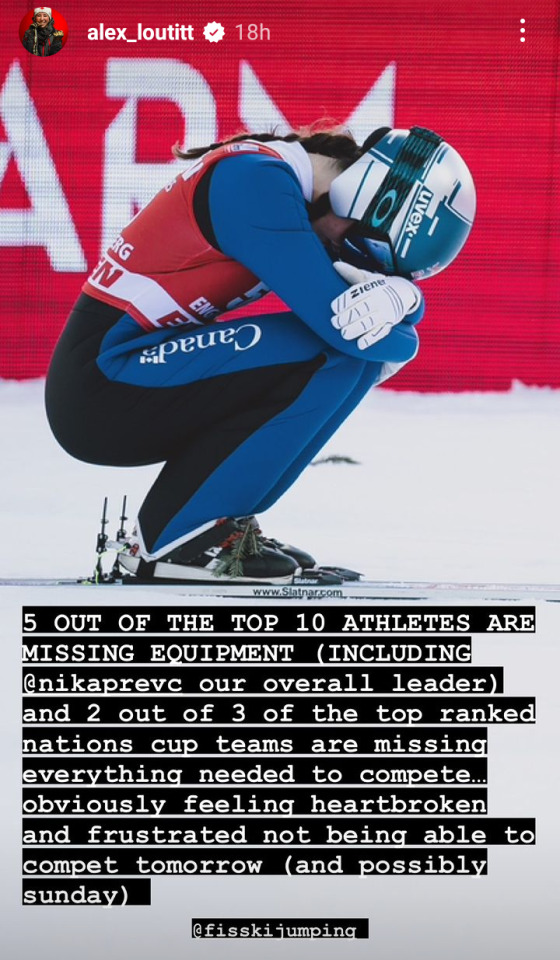#2024 Canadian Nationals
Explore tagged Tumblr posts
Text




It's important to showcase Anthony Paradis's free program costume (seen here at the 2024 Junior Worlds, 2023 Junior Grand Prix Osaka and 2024 Canadian Nationals), even though there's a desperate lack of photos of it! He skated to Yours by Conan Gray.
As per his interview with Golden Skate:
“It’s super beautiful,” he said of his distinct sleeveless costume, a mix of shredded white lace, tears and red crystals, representing blood. “I love it. It's kind of like a heartbreak. You know, you get stabbed in the heart and then it bleeds. Just, it's a beautiful thing.”
(Sources: 1, 2, 3 and 4)
#Anthony Paradis#Figure skating#Canada#Conan Gray#2023–2024#2023 Junior Grand Prix Osaka#2024 Canadian Nationals#2024 Junior Worlds#pp
89 notes
·
View notes
Text
defending max verstappen on the internet is not enough i need a gun
#with all due respect what was lando THINKING encouraging that bs especially during the NATIONAL ANTHEM#like come on dude not a good look use your brain you���re a racing driver and a good one so you’ve GOT to have one#max verstappen#canadian gp 2024
2K notes
·
View notes
Text
🖐🍑-> 😍->😳
Oh my god George he only congratulated you why did you get so flustered

830 notes
·
View notes
Text
Viewing information for the University Games and Canadian Nationals is now available on our website.
#figure skating#winter universiade#winter universiade 2025#b comps#canadian nationals#canadian nationals 2025#national comps#events#season: 2024 2025#how to watch
29 notes
·
View notes
Text
If I had a nickel for every time max matched another drivers lap time during quali, I'd have two nickels. Which isn't a lot, but it's weird that it happened twice
81 notes
·
View notes
Text

Around the Bend
What do you think about my pic?
#What do you think about my pic?#River#travel#original photography#vacation#tourist attraction#landmark#landscape#countryside#Rocky Mountains#Canada#summer 2024#Alberta's Rockies#Canadian Rockies#photo of the day#flora#nature#forest#sub-alpine fir#Alberta#Banff National Park
22 notes
·
View notes
Text



Our thoughts are with the 25,000 forced to flee forest fires in Jasper
#Town of Jasper#Jasper National Park#Alberta#climate change#forest fires#evacuation#wildfires#heat dome#25-07-2024#Rocky Mountains#Canadian Rockies#natural disaster#grief
43 notes
·
View notes
Text
"In these circumstances, the commercial economy of the fur trade soon yielded to industrial economies focused on mining, forestry, and fishing. The first industrial mining (for coal) began on Vancouver Island in the early 1850s, the first sizeable industrial sawmill opened a few years later, and fish canning began on the Fraser River in 1870. From these beginnings, industrial economies reached into the interstices of British Columbia, establishing work camps close to the resource, and processing centers (canneries, sawmills, concentrating mills) at points of intersection of external and local transportation systems. As the years went by, these transportation systems expanded, bringing ever more land (resources) within reach of industrial capital. Each of these developments was a local instance of David Harvey's general point that the pace of time-space compressions after 1850 accelerated capital's "massive, long-term investment in the conquest of space" (Harvey 1989, 264) and its commodifications of nature. The very soil, Marx said in another context, was becoming "part and parcel of capital" (1967, pt. 8, ch. 27).
As Marx and, subsequently, others have noted, the spatial energy of capitalism works to deterritorialize people (that is, to detach them from prior bonds between people and place) and to reterritorialize them in relation to the requirements of capital (that is, to land conceived as resources and freed from the constraints of custom and to labor detached from land). For Marx the
wholesale expropriation of the agricultural population from the soil... created for the town industries the necessary supply of a 'free' and outlawed proletariat (1967, pt. 8, ch. 27).
For Gilles Deleuze and Felix Guattari (1977) - drawing on insights from psychoanalysis - capitalism may be thought of as a desiring machine, as a sort of territorial writing machine that functions to inscribe "the flows of desire upon the surface or body of the earth" (Thomas 1994, 171-72). In Henri Lefebvre's terms, it produces space in the image of its own relations of production (1991; Smith 1990, 90). For David Harvey it entails the "restless formation and reformation of geographical landscapes," and postpones the effects of its inherent contradictions by the conquest of space-capitalism's "spatial fix" (1982, ch. 13; 1985, 150, 156). In detail, positions differ; in general, it can hardly be doubted that in British Columbia industrial capitalism introduced new relationships between people and with land and that at the interface of the native and the nonnative, these relationships created total misunderstandings and powerful new axes of power that quickly detached native people from former lands. When a Tlingit chief was asked by a reserve commissioner about the work he did, he replied
I don't know how to work at anything. My father, grandfather, and uncle just taught me how to live, and I have always done what they told me-we learned this from our fathers and grandfathers and our uncles how to do the things among ourselves and we teach our children in the same way.
Two different worlds were facing each other, and one of them was fashioning very deliberate plans for the reallocation of land and the reordering of social relations. In 1875 the premier of British Columbia argued that the way to civilize native people was to bring them into the industrial workplace, there to learn the habits of thrift, time discipline, and materialism. Schools were secondary. The workplace was held to be the crucible of cultural change and, as such, the locus of what the premier depicted as a politics of altruism intended to bring native people up to the point where they could enter society as full, participating citizens. To draw them into the workplace, they had to be separated from land. Hence, in the premier's scheme of things, the small reserve, a space that could not yield a livelihood and would eject native labor toward the industrial workplace and, hence, toward civilization. Marx would have had no illusions about what was going on: native lives, he would have said, were being detached from their own means of production (from the land and the use value of their own labor on it) and were being transformed into free (unencumbered) wage laborers dependent on the social relations of capital. The social means of production and of subsistence were being converted into capital. Capital was benefiting doubly, acquiring access to land freed by small reserves and to cheap labor detached from land.
The reorientation of land and labor away from older customary uses had happened many times before, not only in earlier settler societies, but also in the British Isles and, somewhat later, in continental Europe. There, the centuries-long struggles over enclosure had been waged between many ordinary folk who sought to protect customary use rights to land and landlords who wanted to replace custom with private property rights and market economies. In the western highlands, tenants without formal contracts (the great majority) could be evicted "at will." Their former lands came to be managed by a few sheep farmers; their intricate local land uses were replaced by sheep pasture (Hunter 1976; Hornsby 1992, ch. 2). In Windsor Forest, a practical vernacular economy that had used the forest in innumerable local ways was slowly eaten away as the law increasingly favored notions of absolute property ownership, backed them up with hangings, and left less and less space for what E.P. Thompson calls "the messy complexities of coincident use-right" (1975, 241). Such developments were approximately reproduced in British Columbia, as a regime of exclusive property rights overrode a fisher-hunter-gatherer version of, in historian Jeanette Neeson's phrase, an "economy of multiple occupations" (1984, 138; Huitema, Osborne, and Ripmeester 2002). Even the rhetoric of dispossession - about lazy, filthy, improvident people who did not know how to use land properly - often sounded remarkably similar in locations thousands of miles apart (Pratt 1992, ch. 7). There was this difference: The argument against custom, multiple occupations, and the constraints of life worlds on the rights of property and the free play of the market became, in British Columbia, not an argument between different economies and classes (as it had been in Britain) but the more polarized, and characteristically racialized juxtaposition of civilization and savagery...
Moreover, in British Columbia, capital was far more attracted to the opportunities of native land than to the surplus value of native labor. In the early years, when labor was scarce, it sought native workers, but in the longer run, with its labor needs supplied otherwise (by Chinese workers contracted through labor brokers, by itinerant white loggers or miners), it was far more interested in unfettered access to resources. A bonanza of new resources awaited capital, and if native people who had always lived amid these resources could not be shipped away, they could be-indeed, had to be-detached from them. Their labor was useful for a time, but land in the form of fish, forests, and minerals was the prize, one not to be cluttered with native-use rights. From the perspective of capital, therefore, native people had to be dispossessed of their land. Otherwise, nature could hardly be developed. An industrial primary resource economy could hardly function.
In settler colonies, as Marx knew, the availability of agricultural land could turn wage laborers back into independent producers who worked for themselves instead of for capital (they vanished, Marx said, "from the labor market, but not into the workhouse") (1967, pt. 8, ch. 33). As such, they were unavailable to capital, and resisted its incursions, the source, Marx thought, of the prosperity and vitality of colonial societies. In British Columbia, where agricultural land was severely limited, many settlers were closely implicated with capital, although the objectives of the two were different and frequently antagonistic. Without the ready alternative of pioneer farming, many of them were wage laborers dependent on employment in the industrial labor market, yet often contending with capital in bitter strikes. Some of them sought to become capitalists. In M. A. Grainger's Woodsmen of the West, a short, vivid novel set in early modern British Columbia, the central character, Carter, wrestles with this opportunity. Carter had grown up on a rock farm in Nova Scotia, worked at various jobs across the continent, and fetched up in British Columbia at a time when, for a nominal fee, the government leased standing timber to small operators. He acquired a lease in a remote fjord and there, with a few men under towering glaciers at the edge of the world economy, attacked the forest. His chances were slight, but the land was his opportunity, his labor his means, and he threw himself at the forest with the intensity of Captain Ahab in pursuit of the white whale. There were many Carters.
But other immigrants did become something like Marx's independent producers. They had found a little land on the basis of which they hoped to get by, avoid the work relations of industrial capitalism, and leave their progeny more than they had known themselves. Their stories are poignant. A Czech peasant family, forced from home for want of land, finding its way to one of the coaltowns of southeastern British Columbia, and then, having accumulated a little cash from mining, homesteading in the province's arid interior. The homestead would consume a family's work while yielding a living of sorts from intermittent sales from a dry wheat farm and a large measure of domestic self-sufficiency-a farm just sustaining a family, providing a toe-hold in a new society, and a site of adaptation to it. Or, a young woman from a brick, working-class street in Derby, England, coming to British Columbia during the depression years before World War I, finding work up the coast in a railway hotel in Prince Rupert, quitting with five dollars to her name after a manager's amorous advances, traveling east as far as five dollars would take her on the second train out of Prince Rupert, working in a small frontier hotel, and eventually marrying a French Canadian farmer. There, in a northern British Columbian valley, in a context unlike any she could have imagined as a girl, she would raise a family and become a stalwart of a diverse local society in which no one was particularly well off. Such stories are at the heart of settler colonialism (Harris 1997, ch. 8).
The lives reflected in these stories, like the productions of capital, were sustained by land. Older regimes of custom had been broken, in most cases by enclosures or other displacements in the homeland several generations before emigration. Many settlers became property owners, holders of land in fee simple, beneficiaries of a landed opportunity that, previously, had been unobtainable. But use values had not given way entirely to exchange values, nor was labor entirely detached from land. Indeed, for all the work associated with it, the pioneer farm offered a temporary haven from capital. The family would be relatively autonomous (it would exploit itself). There would be no outside boss. Cultural assumptions about land as a source of security and family-centered independence; assumptions rooted in centuries of lives lived elsewhere seemed to have found a place of fulfillment. Often this was an illusion - the valleys of British Columbia are strewn with failed pioneer farms - but even illusions drew immigrants and occupied them with the land.
In short, and in a great variety of ways, British Columbia offered modest opportunities to ordinary people of limited means, opportunities that depended, directly or indirectly, on access to land. The wage laborer in the resource camp, as much as the pioneer farmer, depended on such access, as, indirectly, did the shopkeeper who relied on their custom.
In this respect, the interests of capital and settlers converged. For both, land was the opportunity at hand, an opportunity that gave settler colonialism its energy. Measured in relation to this opportunity, native people were superfluous. Worse, they were in the way, and, by one means or another, had to be removed. Patrick Wolfe is entirely correct in saying that "settler societies were (are) premised on the elimination of native societies," which, by occupying land of their ancestors, had got in the way (1999, 2). If, here and there, their labor was useful for a time, capital and settlers usually acquired labor by other means, and in so doing, facilitated the uninhibited construction of native people as redundant and expendable. In 1840 in Oxford, Herman Merivale, then a professor of political economy and later a permanent undersecretary at the Colonial Office, had concluded as much. He thought that the interests of settlers and native people were fundamentally opposed, and that if left to their own devices, settlers would launch wars of extermination. He knew what had been going on in some colonies - "wretched details of ferocity and treachery" - and considered that what he called the amalgamation (essentially, assimilation through acculturation and miscegenation) of native people into settler society to be the only possible solution (1928, lecture xviii). Merivale's motives were partly altruistic, yet assimilation as colonial practice was another means of eliminating "native" as a social category, as well as any land rights attached to it as, everywhere, settler colonialism would tend to do.
These different elements of what might be termed the foundational complex of settler colonial power were mutually reinforcing. When, in 1859, a first large sawmill was contemplated on the west coast of Vancouver Island, its manager purchased the land from the Crown and then, arriving at the intended mill site, dispersed its native inhabitants at the point of a cannon (Sproat 1868). He then worried somewhat about the proprieties of his actions, and talked with the chief, trying to convince him that, through contact with whites, his people would be civilized and improved. The chief would have none of it, but could stop neither the loggers nor the mill. The manager and his men had debated the issue of rights, concluding (in an approximation of Locke) that the chief and his people did not occupy the land in any civilized sense, that it lay in waste for want of labor, and that if labor were not brought to such land, then the worldwide progress of colonialism, which was "changing the whole surface of the earth," would come to a halt. Moreover, and whatever the rights or wrongs, they assumed, with unabashed self-interest, that colonists would keep what they had got: "this, without discussion, we on the west coast of Vancouver Island were all prepared to do." Capital was establishing itself at the edge of a forest within reach of the world economy, and, in so doing, was employing state sanctioned property rights, physical power, and cultural discourse in the service of interest."
- Cole Harris, “How Did Colonialism Dispossess? Comments from an Edge of Empire,” Annals of the Association of American Geographers, Vol. 94, No. 1 (Mar., 2004), p. 172-174.
#settler colonialism#settler colonialism in canada#dispossession#violence of settler colonialism#land theft#canadian history#indigenous people#first nations#reading 2024#cole harris#history of british columbia#reservation system#resource extraction#british empire#canada in the british empire#homesteading#marxist theory#capitalism#capitalism in canada#immigration to canada
25 notes
·
View notes
Text
FB/S have withdrawn from Canadian Nationals. Both gave similar statements on their Instagram - Laurence says she stands by Nik and believes him to be a man of "integrity and kindess", Nik denies the allegation (despite both saying they wouldn't comment due to privacy rules, they've both definitely given a statement here imo)
Laurence's statement
Nikolaj's statement
36 notes
·
View notes
Text
DANNY RIC 5TH LETS FUCKING GOOOOOO
13 notes
·
View notes
Text



Audréanne Foster's free skate costume at the 2024 Canadian Nationals. Her program was to music from Pocahontas.
(Sources: 1, 2 and 3)
10 notes
·
View notes
Text
Canada Day is still such a problematic thing. Unless and until we treat first Nation communities with respect and inclusion and basic human rights supports and address race bias and the amplification that first Nation women experience on gender bias plus disabled first Nation person's experience over and above the usual nonsense (IE how with many disenfranchised and discriminated upon diseases like long viral diseases these communities are not even getting diagnosed). Also lgbtqia+ and two spirit first Nations experience an exponential amount of discrimination over and above the usual horror.
We have not yet met the bar of adequate on how we treat our first nation communities. The lack of addressing of gender, race, disability and disease bias within Canada must be recognized as being far over and above that difficulty for first Nation communities as well as people of color particularly, women of color.
It is nice to celebrate a long weekend, Canada has done some good things, but we think we're farther along our human rights accomplishments journey than we are. We have a long way to go. Until we do a Country-Wide *putting on of our big person underpants* and addressing bias in all of its forms within the education, bureaucratic, governmental, legislative, and corporate systems, I don't see how any of this changes, ever.
What's happening to me, the death March off a cliff of gender and disease bias is beyond horrific. But even in the midst of the difficulties I'm experiencing I can only think wow, how much harder it must be for racial discrimination on top of that especially for our first nation communities
The first 5 episodes of the podcast give you a synopsis of what's happening to me. And if you choose to listen remember how much worse it is for those POC communities (I'm not sure it's letting me properly post it via the link feature in Tumblr so I guess you'll have to copy and paste it if that's not clickable) https://podcasters.spotify.com/pod/show/i-am-madeline/episodes/Ep--1---How-do-you-solve-a-problem-e110jks
Here's the latest episode, *Queen Of The Cranky Arses* https://podcasters.spotify.com/pod/show/i-am-madeline/episodes/Queen-Of-The-Cranky-Arses-e2lbfaj
The GoFundMe has most of the news media article links and updates if you need more information(I think I put them in the pinned post of this tumbler as well. But honestly I'm so tired I can't remember). If you decide you'd like to donate the media pieces have links to the GoFundMe so you know that it's for real and it's me.
(but here's the last article for convenience sake https://ricochet.media/en/3991/Canada-MAID-policy-death-by-poverty )
https://gofund.me/cff39173
#british columbia#canada#canadian#disability#disability pride#canada day#myalgicencephalomyelitis#longviral#first nations#two spirit#lgbtqia+#pride month#disability pride month#persons of color#POC#gender bias#race bias#disability bias#human rights#disability human rights#first Nations human rights#Canada Day 2024#long viral#long covid#fibromyalgia#myalgicE#pwme#meawareness
11 notes
·
View notes
Text





Oh no :(

Awww Yuki 🥹
#ski jumping#wsj sapporo 2024#wsj#posted it on the wrong blog at first 🙈#but ughhh i'm so sorry for the girls that can't jump#so unlucky#and canadians will probably lose their nations cup podium spot :(((
29 notes
·
View notes
Text
Viewing information for the European and Canadian Championships is now available on our website.
#figure skating#euros#euros 2024#isu championships#canadian nationals#canadian nationals 2024#national comps#events#season: 2023 2024#how to watch
30 notes
·
View notes
Text
I want to spend a year watching a lot of sports. I'm not entirely sure why, but I'd like to understand and loosely follow as much of the major sports as I can. Can I get opinions on teams I should follow/cheer for? And info on players, where to get news, or where to watch stuff for free or cheap, etc?
I might post a bunch of polls to get feedback on teams and stuff, idk. Ive really loosely followed the Red Sox for years, so I'm not looking for baseball, but hockey, football, soccer - anything about other sports.
#sports#nfl football#2024 nfl season#nfl#mlb#national football league#major league baseball#nba#national basketball association#nhl#national hockey league#mls#major league soccer#cfl#canadian football league#red sox#yankees#boston bruins#boston celtics#boston red sox#new york yankees#san fransisco 49ers#los angeles dodgers#kansas city chiefs
6 notes
·
View notes
Text










Banff National Park, AB (No. 2)
Since the 1960s, park accommodations have been open all year, with annual tourism visits to Banff increasing to over 5 million in the 1990s. Millions more pass through the park on the Trans-Canada Highway. As Banff has over three million visitors annually, the health of its ecosystem has been threatened. In the mid-1990s, Parks Canada responded by initiating a two-year study which resulted in management recommendations and new policies that aim to preserve ecological integrity.
Banff National Park has a subarctic climate with three ecoregions, including montane, subalpine, and alpine. The forests are dominated by Lodgepole pine at lower elevations and Engelmann spruce in higher ones below the treeline, above which is primarily rocks and ice. Mammal species such as the grizzly bear, cougar, wolverine, elk, bighorn sheep and moose are found, along with hundreds of bird species. Reptiles and amphibians are also found but only a limited number of species have been recorded.
The mountains are formed from sedimentary rocks which were pushed east over newer rock strata, between 80 and 55 million years ago. Over the past few million years, glaciers have at times covered most of the park, but today are found only on the mountain slopes though they include the Columbia Icefield, the largest uninterrupted glacial mass in the Rockies. Erosion from water and ice have carved the mountains into their current shapes.
Source: Wikipedia
#travel#original photography#vacation#tourist attraction#landmark#landscape#countryside#Rocky Mountains#Canada#summer 2024#Alberta's Rockies#Canadian Rockies#flora#nature#forest#sub-alpine fir#Alberta#Banff National Park#Bow River#pine#tree#woods#turquoise water#Backswamp Viewpoint
21 notes
·
View notes